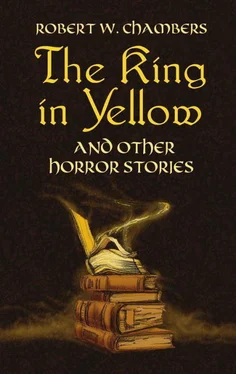He took her in his arms; “Hush, what are you saying? Look,—look out at the sunlight, the meadows and the streams. We shall be very happy in so bright a world.”
She turned to the sunlight. From the window, the world below seemed very fair to her.
Trembling with happiness, she sighed: “Is this the world? Then I have never known it.”
“Nor have I, God forgive me,” he murmured.
Perhaps it was our gentle Lady of the Fields who forgave them both.
“For let Philosopher and Doctor preach
Of what they will and what they will not,—each
Is but one link in an eternal chain
That none can slip nor break nor over-reach.”
“Crimson nor yellow roses nor
The savour of the mounting sea
Are worth the perfume I adore
That clings to thee.”
“The languid-headed lilies tire,
The changeless waters weary me;
I ache with passionate desire
Of thine and thee.”
“There are but these things in the world—
Thy mouth of fire,
Thy breasts, thy hands, thy hair upcurled
And my desire.”
I
ONE MORNING at Julian’s, a student said to Selby; “that is Foxhall Clifford,” pointing with his brushes at a young man who sat before an easel, doing nothing.
Selby, shy and nervous, walked over and began: “My name is Selby,—I have just arrived in Paris, and bring a letter of introduction—“ His voice was lost in the crash of a falling easel, the owner of which promptly assaulted his neighbor, and for a time the noise of battle rolled through the studios of MM. Boulanger and Lefebvre, presently subsiding into a scuffle on the stairs outside. Selby, apprehensive as to his own reception in the studio, looked at Clifford, who sat serenely watching the fight.
“It’s a little noisy here,” said Clifford, “but you will like the fellows when you know them.” His unaffected manner delighted Selby. Then with a simplicity that won his heart, he presented him to half a dozen students of as many nationalities. Some were cordial, all were polite. Even the majestic creature who held the position of Massier, unbent enough to say: “My friend, when a man speaks French as well as you do, and is also a friend of Monsieur Clifford, he will have no trouble in this studio. You expect, of course, to fill the stove until the next new man comes?”
“Of course.”
“And you don’t mind chaff?”
“No,” replied Selby. who hated it.
Clifford, much amused, put on his hat, saying, “You must expect lots of it at first.
Selby placed his own hat on his head and followed him to the door.
As they passed the model stand there was a furious cry of “Chapeau! Chapeau!” and a student sprang from his easel menacing Selby, who reddened but looked at Clifford.
“Take off your hat for them,” said the latter, laughing.
A little embarrassed, he turned and saluted the studio.
“Et moi?” cried the model.
“You are charming,” replied Selby, astonished at his own audacity, but the studio rose as one man, shouting: “He has done well! he’s all right!” while the model, laughing, kissed her hand to him and cried: “À demain beau jeune homme!”
All that week Selby worked at the studio unmolested. The French students christened him “l’Enfant Prodigue,” which was freely translated, “The Prodigious Infant,” “The Kid,” “Kid Selby,” and “Kidby,” to “Kidney,” and then naturally to “Tidbits” where it was arrested by Clifford’s authority and ultimately relapsed to “Kid.”
Wednesday came, and with it M. Boulanger. For three hours the students writhed under his biting sarcasms,—among the others Clifford, who was informed that he knew even less about a work of art than he did about the art of work. Selby was more fortunate. The professor examined his drawing in silence, looked at him sharply, and passed on with a noncommittal gesture. He presently departed arm in arm with Bouguereau, to the relief of Clifford who was then at liberty to jam his hat on his head and depart.
The next day, he did not appear, and Selby, who had counted on seeing him at the studio, a thing which he learned later it was vanity to count on, wandered back to the Latin Quarter alone.
Paris was still strange and new to him. He was vaguely troubled by its splendor. No tender memories stirred his American bosom at the Place du Châtelet, nor even by Notre Dame. The Palais de Justice with its clock and turrets and stalking sentinels in blue and vermilion, the Place St. Michel with its jumble of omnibuses and ugly water-spitting griffins, the hill of the Boulevard St. Michel, the tooting trams, the policemen dawdling two by two, and the table-lined terraces of the Café Vachette, were nothing to him, as yet, nor did he even know, when he stepped from the stones of the Place St. Michel to the asphalt of the Boulevard, that he had crossed the frontier and entered the student zone,—-the famous Latin Quarter.
A cabman hailed him as “bourgeois,” and urged the superiority of driving over walking, A gamin, with an appearance of great concern, requested the latest telegraphic news from London, and then, standing on his head, invited Selby to feats of strength. A pretty girl gave him a glance from a pair of violet eyes. He did not see her, but she, catching her own reflection in a window, wondered at the color burning in her cheeks. Turning to resume her course, she met Foxhall Clifford, and hurried on. Clifford, open-mouthed, followed her with his eyes; then he looked after Selby, who had turned into the Boulevard St. Germain toward the rue de Seine. Then he examined himself in the shop window. The result seemed to be unsatisfactory.
“I’m not a beauty,” he mused, “but neither am I a hobgoblin. What does she mean by blushing at Selby? I never before saw her look at a fellow in my life, neither has any one in the Quarter. Anyway, I can swear she never looks at me, and goodness knows I have done all that respectful adoration can do.”
He sighed, and murmuring a prophecy concerning the salvation of his immortal soul swung into that graceful lounge which at all times characterized Clifford. With no apparent exertion, he overtook Selby at the corner, and together they crossed the sunlit Boulevard and sat down under the awning of the Café du Cercle. Clifford bowed to everybody on the terrace, saying, “You shall meet them all later, but now let me present you to two of the sights of Paris, Mr. Richard Elliott and Mr. Stanley Rowden.”
The “sights” looked amiable and took vermouth.
“You cut tile studio to-day,” said Elliott, suddenly turning on Clifford who avoided his eyes.
“To commune with nature?” observed Rowden.
“What’s her name this time?” asked Elliott, and Rowden answered promptly; “Name, Yvette; nationality, Breton—”
“Wrong,” replied Clifford blandly, “it’s Rue Barrée.”
The subject changed instantly, and Selby listened in surprise to names which were new to him, and eulogies on the latest Prix de Rome winner. He was delighted to hear opinions boldly expressed and points honestly debated, although the vehicle was mostly slang, both English and French. He longed for the time when he too should be plunged into the strife for fame.
The bells of St. Sulpice struck the hour, and the Palace of the Luxembourg answered chime on chime. With a glance at the sun, dipping low in the golden dust behind the Palais Bourbon, they rose, and turning to the east, crossed the Boulevard St. Germain and sauntered toward the École de Medecine. At the corner a girl passed them, walking hurriedly. Clifford smirked, Elliott and Rowden were agitated, but they all bowed, and, without raising her eyes, she returned their salute. But Selby, who had lagged behind, fascinated by some gay shop window, looked up to meet two of the bluest eyes he had ever seen. The eyes were dropped in an instant, and the young fellow hastened to overtake the others.
Читать дальше












